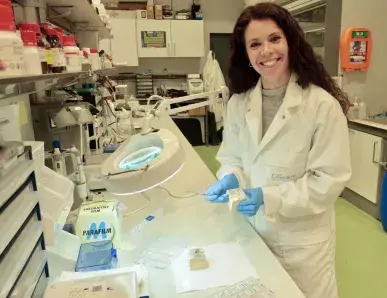Developing nanomaterials to conserve cultural heritage
Aranzazu Sierra-Fernández, PhD in Materials Science and Engineering, has received the Junior Leader postdoctoral fellowship from the "la Caixa" Foundation to pursue a line of research in the Nanomaterials group of CIC nanoGUNE focusing on the study of new methodologies to conserve cultural heritage. The project sets out to develop protective coatings for the conservation of cultural assets, with an emphasis on strength, toughness, durability and compatibility with building materials.

Developing protective coatings for cultural heritage conservation and for the building industry poses a key challenge. These coatings not only have to be resistant and durable, but also compatible and tough in the face of adverse environmental factors such as humidity, thermal variation and atmospheric contamination. The implementation of a hybrid protective coating system, combining organic and inorganic components, capable of self-repair against incipient damage, such as microcracks or surface wear, would increase the longevity and reduce the maintenance requirements of both historic and contemporary structures. Despite progress in polymer self-repair, the efficiency of the mechanisms for building materials is limited, partly due to the absence of optimal repair agents that can act effectively under actual exposure conditions. This knowledge gap is restricting the practical application of self-repair technology, making further research indispensable to overcome these challenges and consolidate self-repair as a practical and effective solution.
In this project, Aranzazu Sierra-Fernández will be addressing the challenge of designing and generating multifunctional hybrid coatings with self-healing and antimicrobial actions, suitable for construction materials. “The challenge will require a multidisciplinary approach to create a methodology so that the new emerging capabilities needed to assemble sophisticated functional materials, such as coatings, can be designed and managed,” explained Aranzazu Sierra, a researcher in nanoGUNE's Nanomaterials group. “To do this, material functionalization technologies and thin-film coatings designed to guide the self-assembly of layer components in the event of damage, and provide the system with antimicrobial properties will be employed,” she added.
Aranzazu Sierra says that “the long-term goal of the project is to create a versatile, cost-effective and environmentally-friendly protective coating technology to safeguard our built cultural heritage and modern buildings; this work may have a significant impact on the conservation of historic heritage and sustainable construction”.
“la Caixa” Foundation Fellowships
The "la Caixa" Foundation has awarded 105 doctoral and postdoctoral fellowships to top young researchers to carry out their projects at universities and research centers in Spain and Portugal. With the INPhINIT doctoral fellowships and the Junior Leader postdoctoral ones, the "la Caixa" Foundation is pursuing the dual aim of retaining and attracting talent to promote research excellence in these countries.
The Fellowships Program of the "la Caixa" Foundation is the most important of those promoted by private organizations in Spain and Europe, both in terms of the number of fellowships offered and the range of disciplines. The organization will be allocating nearly 21 million euros overall to this promotion of doctoral and postdoctoral fellows. Both programs have been co-funded by the European Commission through the Marie Skłodowska-Curie COFUND Actions in the context of the Horizon 2020 framework program.
